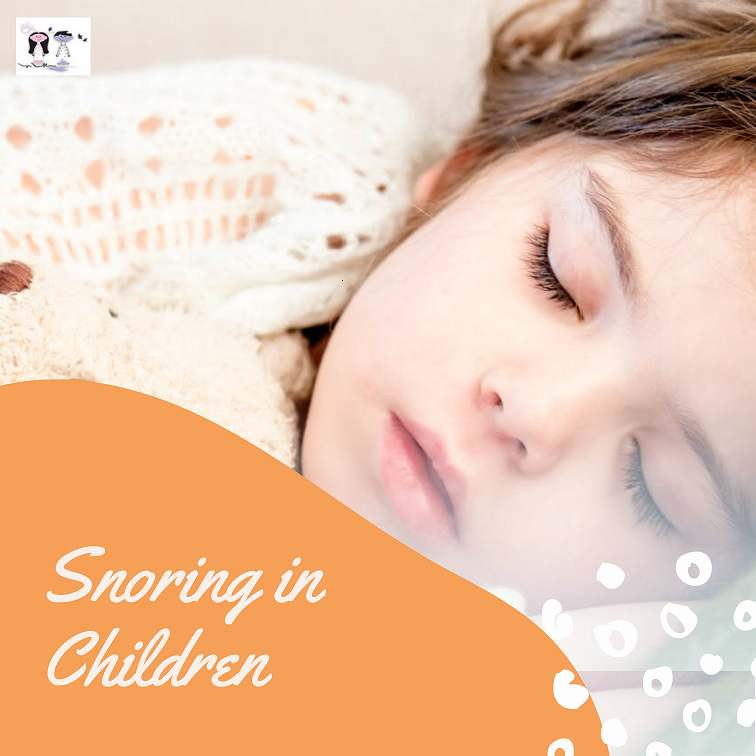“Doctor, you have to help me! Earlier it was just my husband. But now that my son has started snoring too, it’s like a cacophonic carpenter’s workshop with the drilling and sawing and hammering all at once!” A very hassled Mrs. Sinha burst into my room the other day. Snoring in children is not as common in adults, but needs to be looked into, nevertheless. Why do kids snore? Should you worry about snoring in children? Is it dangerous? What can be? Read on to find out…
Why does my child snore?

Snoring occurs when the air that your child breathes in, is not allowed to flow freely through their airway. As they breathe in or out, the tissues around the airway vibrate which leads to the sound. Anything that can obstruct the flow of air in the airway can lead to snoring.
Around 15% of children may normally snore and it is not uncommon to find a child snoring with a cold or when very tired. But children who snore on most days a week, make abnormal noises or gasp for breath during sleep do so because of a condition called Obstructive Sleep Apnea. These children also move a lot in bed and then sleep in abnormal postures to enable them to open their airways. Following are the reasons to have Obstructive sleep apnea.
- Swollen Tonsils or Adenoids: Tonsils and adenoids are tissues at the back of the throat that help fight infections. Any infection causes the tonsils / adenoids to swell and this is the most common cause of sleep disordered breathing in kids.
- Obesity: If your child is overweight, s/he is more likely to have a narrow airway which is floppy causing obstruction and sleep related issues.
- Allergies in Nose: Colds and allergies can cause difficulty with breathing and may partially block the airways giving rise to snoring in children.
- Down’s syndrome (Mongolism)– These children tend to have narrow floppy airways and have a high chance of having snoring with Obstructive Sleep Apnea
- Special Children: These are children with delay in development, those with weak muscle disorders, abnormal shape of the face and skull, etc. These children are at a very high risk of having difficulty in breathing during sleep.
- Environmental air: If your child is exposed to second-hand smoke or contaminants it may put your kid at a higher risk for snoring.
Should I be worried about my child’s snoring?
Though snoring may be normal at some times or temporary at others (like if it is due to a congestion), you can watch out for the below signs. Contact your child specialist if your child:
- Snores frequently viz. on three or more nights per week
- Gasps or has bouts of long pauses in his/her breathing while sleeping
- Snores loudly (as if s/he were an adult)
- Has other issues along with snoring like bed wetting, morning headaches, sleepiness in the day, is obese or is below average in their weight gain, has difficulty concentrating or learning or has Attention deficit hyperactivity disorder (ADHD)

Is snoring in kids dangerous?
If your kid’s snoring is not too frequent, it may not be something to worry about. But regular or severe snoring that is a sign of sleep disordered breathing may have harmful effects.
As mentioned earlier, Obstructive Sleep Apnea is the biggest concern. It can affect the amount of oxygen that your child receives in his / her sleep. This condition has been related to poor brain development, heart issues like high blood pressure, behaviour issues and poor academic performance.
Even if your child does not have obstructive sleep apnea, their snoring may still cause impaired brain functioning (specifically cognitive impairment), behavioural issues and may even affect the nervous system and circulation.
What is the treatment for snoring in kids?
If your child’s snoring is light and not too frequent, it may go away on its own without needing any treatment. However, the best judge of whether one needs to wait and watch is your child specialist. Hence the first step would be to talk to your child specialist. Your child specialist will examine your child and may ask for a few tests to find out the cause of your child’s snoring.
If the cause of your child’s snoring is due to tonsils or adenoids or a deviated nose partition, surgery may be advised. Obstructive sleep apnea may be treated by devices called Positive Airway Pressure devices. Obesity may need you to work with your child specialist and a child nutritionist.
What you can do as parents, is to improve your child’s sleep hygiene i.e. see to it that your child has fixed sleep schedules, has no screen time before bed and sleeps in an environment that is dark, quiet and comfortable.
————————————————————-
Dr. Indu Khosla is a Consultant Pediatrician and Pediatric Pulmonologist with over thirty years of experience. She has special interest in Sleep Medicine, Obesity and Allergies. For any queries, feel free to get in touch with Dr. Indu Khosla at (91)-22-26355829, 26300730/ 8779982090
Expert Moderator: Dr. Indu Khosla | Blog Author: Dr. Amrita Sodhi





